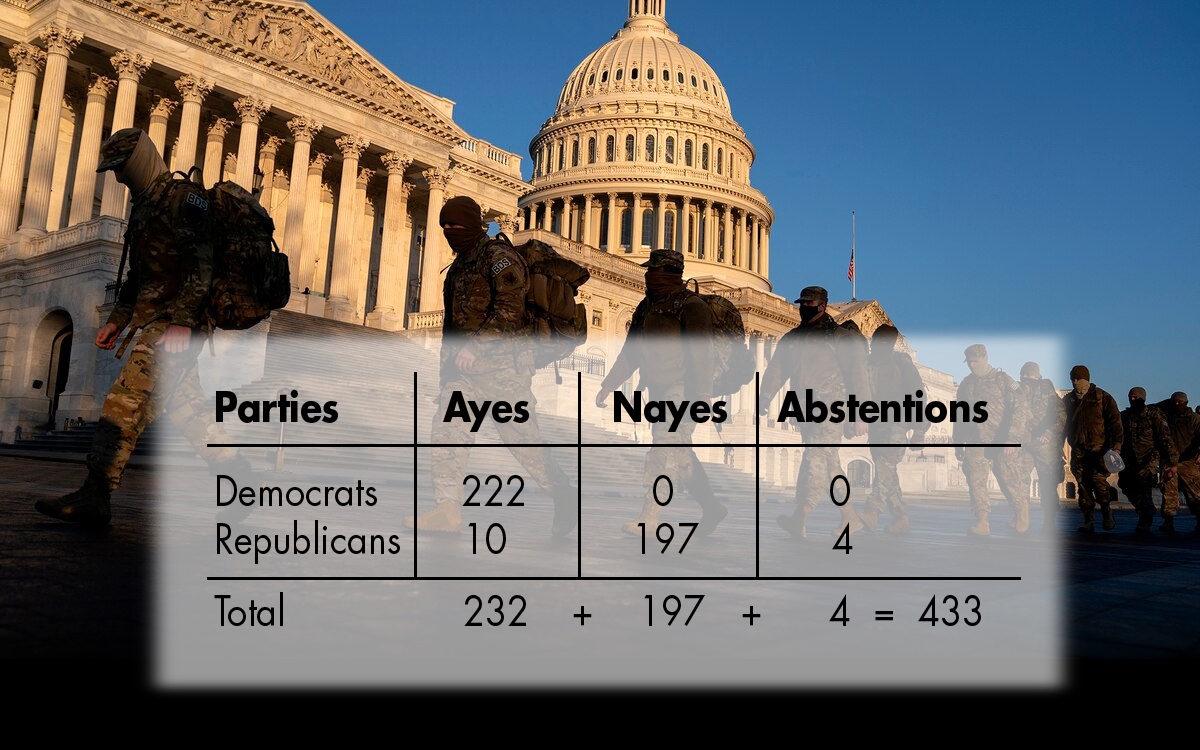
To Impeach or not to teach?
By Howard Adelman
One of the interesting items to note about the whole affair of Donald Trump and the storming of the Capitol is that impeachment was not really a question for almost all the legislators. Virtually all Democrats knew what they wanted to do. A small group of Republicans, not that much larger than those who voted for impeachment, did not want to impeach POTUS, not because they were uncertain about whether he committed a high crime, in particular, one of inciting sedition, but because a rapid process might be flawed, due process was not observed, the time left was too short to deliberate the matter, or some combination of these reasons that prevented a proper investigation of the matter and the right to a defence. They urged their Democratic colleagues to practice restraint and not politicize the impeachment process.
Of course, the vast majority voted “Nay” because, if they voted otherwise, it might affect their position in the party or their prospects for re-election two years hence. Liz Cheney, who voted “Aye,” after insisting she wasn’t going anywhere, before the evening was out, reportedly resigned her position as the third ranking Republican in the House of Representatives. Some Republicans voted “Nay” because they feared not simply for their own lives, but for the lives of their wives and children.
Of course, this is not how most defended their negative vote. Their free speech rights were being quashed. Republicans just lost two Senate seats in Georgia to the Democrats in a runoff vote, in good measure because of Trump’s attacks on the Republican state governor and the secretary of state for not ensuring that enough ballots went his way to assign the electoral college votes of Georgia to him. This was the same election responsible for electing QAnon Representative Marjorie Taylor Greene of Georgia. Greene complained of suppression of her rights, justifying her Nay vote. Lauren Boebert of Colorado went further and tweeted the speaker’s location during the invasion of the Capitol.
Jim Jordan of Ohio and Glen Grothman of Wisconsin joined Greene in denouncing the cancel culture that wanted to silence Trump so that he could not have the opportunity to investigate and expose the election as fraudulent, the same ballot that reelected all of them. Tom McClintock of California dubbed Donald’s speech to the mob at his rally on Wednesday as freedom of speech and just normal politics when the Donald instructed his supporters to march to the Capitol. The Donald insisted that the bottom line in the political arena was determined by strength. The use of fiery language before a mob was just free speech; Steve King of Iowa complained that the Lord of Lies had been “deplatformed” in “cyber god’s Kristallnacht.” How obscene could they get!
The invaders of the Capitol who killed a Capitol police officer were not charged with denying First Amendment rights to certify the vote as honest. Only their will had been repressed. Only the attackers, not the legislators who hid under their seats or in safe rooms, had been denied their rights of free speech. Only Donald Trump suffered from cancel culture when the Silicon Valley cabal of large media companies canceled his ability to use social media to spread lies and incite insurrection. Trump was not the arsonist. The Democrats in their efforts to douse “the burning embers of the movement” with gasoline were destroying “the whole experiment in self-government” according to one Republican legislator. It was a topsy-turvy Alice in Wonderland world which they had joined.
Of course, Nancy Pelosi, the Democratic Speaker of the House was not exactly angelic when she insisted Donald Trump was “a clear and present danger” and that is why he must be impeached. She knew full well that the chance of Mitch McConnell, who still controlled that august body, the Senate, until inauguration day, would be most unlikely to call the Senate together to hold a trial before inauguration day. The vote to impeach would not remove The Donald from the presidency, only deservedly besmirch his name.
The star of the day was Liz Cheney (Wyoming), a Republican who voted to impeach Donald Trump insisting that, “there has ‘never been a greater betrayal’ by a president to his office and his oath to the Constitution days after a pro-Trump mob attacked the Capitol.” John Katko from upstate New York and Adam Kinzinger from Illinois were also vociferous critics of Trump. Even a dyed-in-the-wool Trump loyalist like House Minority Leader Kevin McCarthy from California insisted that Trump had been “irresponsible” in the way he addressed the mob; he still voted Nay.
The actual vote in the Senate will not depend on innocence or guilt of the charge, but on the politics of dealing with the charge. Further, some who would wrack vengeance on the shattered future life of Donald Trump would like to add to his woes by denying him the post-service benefits of security, pension and other office benefits. Unfortunately, that will require new legislation once Biden takes office.
Since there is so little time left – 7 days – would it not have been better to travel the political route? After all, quite aside from all the court cases expected to follow him into private life – assaulted women suing him, commercial imbroglios, tax issues – it is expected that Trump will face charges for conflicts of interest and possibly obstruction of justice in addition to the cases that state attorney generals are preparing against him, a criminal charge of sedition is unlikely since the bar of proof beyond a reasonable doubt is so high. Case law suggests that his directive to the mob at the rally on 6 January 2021 to march up to the Capitol is not the same as ordering the mob to march up there, capture, occupy and wreak havoc on the legislative building itself. That you must fight, that you must have strength, are considered metaphorical versions of political conversation and speech making. A criminal charge to stick would probably require that his directions be more explicit and not implicit.
The American Second Amendment, unlike other political jurisdiction, is fairly broad in terms of permissible speech. Even Guliani’s urging the mob to engage in trial by combat might not be enough to satisfy a criminal charge of incitement, unless, of course, he offered explicit directions that we know nothing of at this time. Further, the renewed Merrick Garland Justice Department will have its hands full recovering from the destructive effects of the Trump regime. Attorney General Garland might not want to invest human resources in a case that would meet the standard of a good prospect of a conviction.
What about Vice-President Michael Pence invoking the 25th Amendment instead of using impeachment? This was the Democrat’s preference. But that would require the willingness of Pence to initiate such an action and his ability to round up at least half the remaining cabinet to support making a finding of incapacity. Quite aside from his personal reluctance, given his desire to become a future candidate and needing the support of Donald Trump’s base, there is the problem that the 25th Amendment was designed to deal with incapacity, possibly including mental incapacity, but not willful criminal behaviour. That is the rationale for the impeachment process. Pence declined because he said that he wanted to give “the nation time to heal.” He wanted members of Congress to “avoid actions that would further divide and inflame the passions of the moment.” An arsonist incites a mob’s destruction of the Capitol and threatens the lives of its members, but responsibility was not assigned to Trump for spreading lies about a fraudulent election of for stirring up the passions of the mob, but loaded on the Democrats for insisting that the president be held accountable for his actions
The real reason for Pence not taking this route was explained in another long letter by Pence to members of Congress, not about invoking the 25th Amendment, but explaining why on 6 January he could not comply with Donald Trump’s pressure on him as chair of the Senate to set aside the electoral votes declaring Biden as president elect. His role was only ceremonial. For that, Pence had already become a target of the insurrectionists who planned to lynch him. As Donald Trump put it, “Mike Pence, I hope you get to stand up for the good of our Constitution and for the good of our country, and if you’re not, I’m going to be very disappointed in you.” Trump subsequently locked him out of the White House. Pence had no interest in rousing Trump’s supporters further.
I suspect the real urgency for pushing the impeachment process was preventing Trump from using his very wide-ranging pardon powers to get a wide swath of family members, cronies and even insurrectionists off the hook. The fear that he can pardon himself seems far-fetched. He may issue such a pardon, but the Supreme Court, with a majority rooted in Originalism as a basic legal theory, is unlikely to set aside the court ruling in 1974, before Richard Nixon resigned, that no person can be the judge and pardoner of his own case. Extending a pardon is an act of extending mercy to another, even if this is not what motivated Trump thus far. Further, there is a very good chance that Trump will pardon even unnamed individuals and offer an amnesty for certain categories of actions. Such pardons would likely be considered lawful, even if an abuse of the intent of the power. Clearly, the law governing the use of pardons needs to be updated in light of Trump’s abuse of the provision. But none of Pelosi’s moves are likely to prevent Trump from abusing his powers. In any case, since there is no pardon for obstructing justice, Donald Trump can be expected to face legal action on this score.
The real impact of all of this will mostly fall on the Republican Party itself. The party is already continuing to lose support, donors and legitimacy. This may have been what most motivated Mitch McConnell to try to stem the tide by insisting that Trump was directly responsible for the insurrection and AWOL in tampering it down. McConnell even signalled that he was open to voting for impeachment, probably in an effort to purge the party of Trumpism.
I think that the most important after-effect of the whole affair focuses on the far right in the Republican Party and the white supremacist enablers who support or at least sympathize with the alt-right efforts. Routing out the insurrectionists offers an opportunity to destroy the extreme right-wing of the party. The investigation of the insurgency is already well underway. The FBI is evidently doing everything it can to identify all the conspirators, with proper attention to due process and very sensitive attention to the law. Foreign governments like Canada have already announced that they are considering designating extremist groups, such as Proud Boys, as terrorists and adding them to the country's list of organized terrorist organizations. The extreme right is a broad movement with millions of sympathizers, and the investigations and trials and hearings that will follow can provide an opportunity to exhume this menace to American democracy.
My eldest son believes it might also turn Trump into a martyr. Another reader suggested that QAnon is becoming the core of a new American religion. There is no doubt that this is a real danger, but I believe it is one that must be countered by the rule of law, by transparency and by truth. The last has been the most important victim of Trump’s campaign of lies about the alleged fraudulent 2020 election. Even after the insurrection, 71 per cent of Republicans still believe Trump. As I implied in my previous column, it is critical that the dangerous far right be excised in the American polity.
That entails naming and at the very least shaming the legislators who were enablers of the insurrectionists. Based on their lies, their fiery speeches and even Jeff Haley’s raising a fist in solidarity, on the evidence available, it would seem that there is no basis for criminal charges, expulsion from Congress or even censure. This is in spite of their parroting of Trump’s falsehoods and claims that the election was a fraud and he was the real winner. Those who supported the position that the election was stolen carry a tremendous responsibility for riling those right-wingers who disrupted the counting of the Electoral College vote confirming Joe Biden’s win. But there will be an investigation and who knows what will turn up. There is a rumour that members of Congress actually threatened fellow members. But though these actions were clearly irresponsible in leading the lying chorus, that in itself is not incitement to insurrection or criminal. Censure, however, and informal sanctions may be considered.
The rise of Trump and his performance in office points to a whole other area – the need for reform of the duties and responsibilities of the president, turning what pre-Trump were established norms about conflicts of interest and obstruction of justice, about the independence of the Attorney General and reporting on payment of taxes, into written legislation. Even more important are laws focused on foreign interference in the democratic process in American domestic politics. Harder to achieve will be laws against voter suppression, gerrymandering, disenfranchising voters, campaign financing and even minimum common standards in the conduct of elections.
That is a long and urgent agenda for an administration that already faces enormous challenges ranging from Iran to COVID-19. My hope is that the investigation of the insurrection will provide a much broader opportunity for electoral reform, especially since so many on the Republican side held this up as their banner in opposing impeachment.
There is another realm. As one pundit wrote, “The results of Wednesday’s melee don’t only threaten U.S. domestic institutions, but our national security interests and foreign policy priorities.” America has become an exporter of right-wing extremism. They spread their distrust of democracy in the name of democracy to foster a transnational fascist movement. America is an exporter of extremist right-wing and white supremacist ideology. At the same time, the U.S. has lost most of its moral standing in demanding that other regimes adhere to a high democratic standard. Further, many of the human rights advocates in Hong Kong and other jurisdictions fled to the United States as a safe haven and, surprisingly, a number became supporters of Donald Trump:
- “Barefoot” lawyer Chen Guangcheng from China
- Bob Fu of ChinaAid
- Wang Dan, a former Chinese student leader
- Alexander Otaola, a Miami-based Cuban activist
- Ahmad Batebi, an Iranian dissident, called Ashli Babbit, the 33-year-old ex-airforce rioter who was killed on 6 January, a martyr
- Masih Alinejad, another Iranian dissident.
With a background in confrontational politics and backing from Trump, they have often allied with Trump and identified with his protests against rigged elections.
Of all the negative aspects of this whole crisis, this is, in my mind, the worst
Photo: MilitaryTimes








